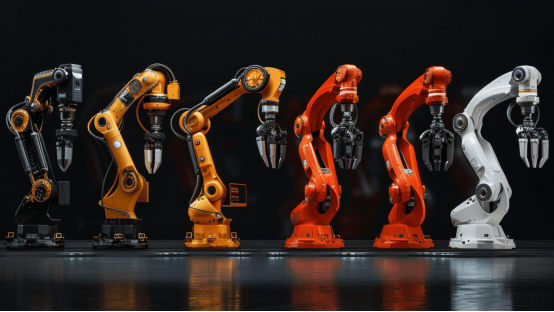Top Eight Industrial Robot Companies in 2024: Manufacturing the Most Advanced Robots

In today's rapidly developing manufacturing industry, industrial robots have become a highly promising field that is profoundly changing the operations of various factories and industries. With the growing demand for efficiency and automation, the application of robots has gradually become an indispensable part of modern production processes. By addressing repetitive, dangerous, or highly precise tasks, industrial robots enable workers to concentrate their efforts on more complex and advanced tasks.
According to the International Federation of Robotics (IFR), there are approximately 3 million industrial robots operating in factories around the world. These robots not only handle heavy and costly jobs but also take care of time-consuming, dirty, and hazardous tasks, freeing workers to carry out more valuable and meaningful work.
Artificial Intelligence in Robots
The application of artificial intelligence in robotic technology is one of today's significant innovations. Undoubtedly, AI robots are disrupting the way we live and work. It is expected that by 2024, the artificial intelligence robot market will approach $20 billion, with the U.S. market accounting for about $6.2 billion of that. Furthermore, research indicates that by 2030, this market's expenditure may exceed $35 billion. AI enables robots to learn from experience, adapt to new situations, and make complex decisions independently. This technology is currently driving advancements in industries such as manufacturing, healthcare, and transportation. Modern technologies such as autonomous vehicles, automated factories, surgical robots, and drones all rely on this technology for support.

Application Areas of AI Robots
Artificial intelligence enables robots to learn from experience, adapt to new conditions, and make independent complex decisions. This transformation through automation and overall efficiency improvement is changing many industries. AI robots have become widespread across several sectors, including but not limited to the following fields:
- Manufacturing: AI robots can be used for defect detection, personalized product manufacturing, and optimizing assembly line processes.
- Healthcare: AI robots can assist in surgeries, transport medical supplies, disinfect patient rooms, and even help patients move.
- Transportation: AI powers autonomous cars and drone delivery systems. For example, Waymo, a subsidiary of Google, and Amazon are testing fully autonomous taxis and delivery drones.
Eight Notable Industrial Robot Companies
Here are some companies that design industrial robots, bringing automation and innovation to a range of tasks (not in any specific order):
1. ABB
ABB Ltd. is headquartered in Zurich, Switzerland. Founded in 1988, it is an industrial robot supplier and manufacturer developing and manufacturing robot systems, software, and services for various industrial applications. The company offers a variety of industrial robots, including articulated robots, collaborative robots, Selective Compliant Articulated Robot Arm (SCARA) robots, Delta robots, paint robots, and Autonomous Mobile Robots (AMR). ABB’s robotics division is a pioneer in robotics and digital services, providing innovative solutions for various industries, including automotive, electronics, and logistics. As one of the world’s leading robot suppliers, ABB has delivered over 500,000 robot solutions globally, helping customers of all sizes improve productivity, flexibility, and ease of use while enhancing output quality. It has more than 11,000 employees at over 100 locations in over 53 countries.
2. KUKA
KUKA was founded in 1898 and initially started as an acetylene gas manufacturer. The company first entered the industrial automation sector in 1956, introducing automated welding systems, and produced its first welding robot in 1971. As a leading global provider of intelligent automation solutions, KUKA offers customers one-stop services ranging from robots and units to fully automated systems and their networks, covering markets such as automotive, electronics, general industry, consumer goods, e-commerce/retail, and healthcare. KUKA Group is headquartered in Augsburg, Germany, with sales of about €3.2 billion and approximately 14,000 employees.
3. FANUC
Since Dr. Seiuemon Inaba proposed the concept of numerical control in 1956, FANUC has been at the forefront of the global manufacturing revolution. With over 40 years of experience, FANUC offers more than 100 models of robots, including articulated robots and Delta robots, widely used in various industrial applications. The robots produced by FANUC can support effective loads of up to 2,300 kg and reach extensions of up to 4.7 meters. FANUC robots are equipped with vision systems and force sensing tools, enabling them to accurately perform complex tasks. FANUC provides comprehensive support and training programs to ensure customers maximize the use of their robots. This includes technical assistance, spare parts, and maintenance services to ensure the robots operate at optimal performance, as well as integration services to adapt to existing workflows. FANUC’s robots are used in over 20 industries, including aerospace, automotive, electronics, food and beverage, and pharmaceuticals, and they can perform a range of factory tasks, including welding, material handling, assembly, and packaging, as well as more specialized tasks such as painting and palletizing.
4. Yaskawa
Yaskawa Electric Corporation was established in 1915 in Kitakyushu, Japan, transforming from an electric motor manufacturer to an automation company and now a mechatronics company. Yaskawa’s Motoman robotics division produces robots for various applications. The company has installed over 600,000 robots worldwide, widely used in electrical and electronic devices, semiconductor manufacturing, biomedical, food, medical products, and logistics industries. Yaskawa robots can perform tasks including arc welding, spot welding, material handling, and painting. The company provides a comprehensive range of collaborative robots, SCARA robots, controllers, software, positioning systems, vision systems, and grippers, all of which enhance the automation processes of businesses. They are also committed to developing solutions that include artificial intelligence and deep learning to enhance robot intelligence.
5. Omron
Omron is a multinational company headquartered in Pleasanton, California. The company focuses on industrial automation and robotic technology, including software and vision guidance. Adept has offices in various locations across the U.S. as well as in Dortmund, Germany, Paris, France, and Singapore. The company’s robotics division, Omron Automation, has deployed over 20,000 robots globally, benefiting from a unique combination of robots, software, and integrated control architecture designed to address the challenges of today’s factory automation. Omron specializes in industrial automation, offering a complete product line from sensors to robots, and from controls to software. Its products are suited for challenging manufacturing environments, emphasizing intelligence and safety.
6. Standard Bots
Standard Bots is a leading AI robotics company. Their mission is to provide easy-to-use, powerful automation solutions for businesses of all sizes. The company is headquartered in the U.S. and is dedicated to offering user-friendly, cost-effective, and feature-rich robotic solutions. Standard Bots combines accessibility with advanced GPT-4 level AI capabilities and powerful hardware, enabling even small manufacturers to achieve automation. The RO1 is a 6-axis collaborative robot (designed to work safely alongside humans) with impressive payload capacity, precision, and a plug-and-play design, making it ideal for machine operations, assembly, packaging, welding, palletizing, and quality control tasks.
7. Mitsubishi
Since its establishment in 1921, Mitsubishi has been at the forefront of technological and product innovation in Japan. The company’s industrial robotics division specializes in vertical articulated robots for assembly, machine operation, and pallet handling applications, providing solutions for packaging, palletizing, operation, assembly, handling, or processing. Mitsubishi Electric has extensive experience in industrial robots and automation equipment, widely used in industries such as semiconductor, automotive, and electronics. Its products emphasize high performance and high stability.
8. Comau
Comau focuses on the automotive industry, possessing expertise in lean manufacturing solutions. Headquartered in Italy, the company offers a range of robots and automation systems. Their robots are designed with effective integration into complex production lines in mind. Their deep understanding of the automotive industry translates into specialized solutions. Comau is an automation and robotics manufacturer based in Turin, Italy, established in 1973, and developed the first laser robot for General Motors in the 1980s. Recently, the company has entered the collaborative robot market with its Aura collaborative robot, which boasts the highest payload capacity in the market (170 kg).
Frequently Asked Questions
How do these companies address ethical issues in robot development?
These companies adhere to strict safety standards in robot design and operation. They invest significantly in user training. For example, Yaskawa offers on-site and online courses through its Yaskawa Academy. These companies have established ethics committees to evaluate and guide the development of robotic systems. According to Vecna Robotics, all of its robots are certified by third parties and comply with ANSI B56.5 and RIA 15.08 safety standards.
What is the most successful AI robot on the market?
The definition of success varies by individual. The Standard Bots RO1 is highly popular for its affordability and ease of use, while ABB, FANUC, and KUKA are highly regarded for their outstanding performance in demanding applications.
Summary
This industry is thriving, from manufacturing, logistics, and healthcare to personal assistants. These forward-looking AI robotics companies are developing cutting-edge AI robots that are reshaping the way we work and live. If you are wondering whether now is the time to join the competition, try XXAI and experience the charm of artificial intelligence.